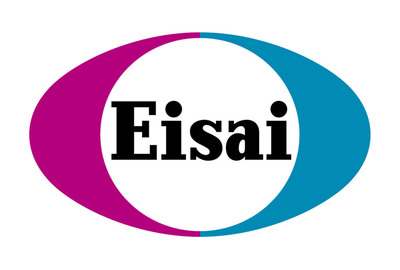LONG-TERM HEALTH OUTCOMES USING SIMULATION MODEL OF INVESTIGATIONAL LECANEMAB IN PATIENTS WITH EARLY ALZHEIMER'S DISEASE PUBLISHED IN A PEER-REVIEWED JOURNAL, NEUROLOGY AND THERAPY
|
TOKYO, April 26, 2022 /PRNewswire/ -- Eisai Co., Ltd. (Headquarters: Tokyo, CEO: Haruo Naito, "Eisai") today announced an article about long-term health outcomes of its investigational anti-amyloid-beta (Aβ) protofibril antibody lecanemab in people living with early Alzheimer's disease (AD) using simulation modeling was published in a peer-reviewed journal Neurology and Therapy. In this simulation, lecanemab treatment is estimated to potentially slow the rate of disease progression, maintaining treated patients for a longer duration in earlier stages of mild cognitive impairment (MCI) due to AD and mild AD (collectively, early AD). The article describes the comparison of the long-term clinical outcomes for the people living with early AD who have amyloid pathology with standard of care (SoC) alone (including stable use of acetylcholinesterase inhibitor or memantine), and with lecanemab with SoC (lecanemab+SoC), using the disease simulation model (AD ACE model1,2) based on the results of a Phase IIb clinical trial (Study 201) evaluating the efficacy and safety of lecanemab. SoC data were estimated from ADNI (Alzheimer's Disease Neuroimaging Initiative) study results. It was shown that the estimated lifetime risk of disease progression to mild, moderate, and severe AD dementia from baseline could potentially be reduced by 7%, 13% and 10% in lecanemab+SoC, respectively, compared to SoC. In the model the mean time advancing to mild, moderate, and severe AD dementia was longer for patients in the lecanemab-treated group than for patients in the SoC group by 2.51 years (SoC vs. lecanemab+Soc: 3.10 vs.5.61 years), 3.13 (6.14 vs. 9.27 years) and 2.34 (9.07 vs.11.41 years) respectively. Subgroup analysis by age and disease severity at baseline also revealed a potentially greater impact on disease progression with earlier initiation of treatment with lecanemab. The incremental mean times for transition to mild and moderate AD dementia were 2.53 and 3.34 years, respectively, when treating MCI due to AD in a subgroup analysis compared to SoC. "With an increasing and aging global population, the number of people diagnosed with Alzheimer's disease will only continue to increase, making it an even more important and urgent public health priority. Alzheimer's disease is growing issue in regard to medical and nursing care costs, but also costs of informal care by family, leading to increased anxiety. The findings from the simulation model suggest early treatment with lecanemab may delay progression to the more severe stages of AD, potentially giving people living with early AD and their loved ones more time together and possibly reducing healthcare costs," said Ivan Cheung, Chairman, Eisai Inc., Senior Vice President, President Neurology Business Group and Global Alzheimer's Disease Officer, Eisai Co., Ltd. "These predicted and simulated long-term health outcomes provide insights for healthcare decision-makers regarding the potential clinical and socioeconomic value of lecanemab. Ongoing Phase 3 studies will soon be able to inform the model inputs and refine the findings. As part of Eisai's commitment to our human healthcare mission and transparency, we will continue to publish data and information about lecanemab." Lecanemab was granted Breakthrough Therapy and Fast Track designations by the U.S. Food and Drug Administration (FDA) in June and December 2021, respectively. Eisai anticipates completing lecanemab's rolling submission of a Biologics License Application for the treatment of early AD to the FDA under the accelerated approval pathway in the first quarter of Eisai's fiscal year 2022, which began April 1, 2022. Additionally, the readout of the Phase 3 confirmatory Clarity AD clinical trial will occur in the Fall of 2022. Eisai initiated a submission to the Pharmaceuticals and Medical Devices Agency (PMDA) of application data of lecanemab under the prior assessment consultation system in Japan in March 2022. Eisai serves as the lead of lecanemab development and regulatory submissions globally with both Eisai and Biogen co-commercializing and co-promoting the product and Eisai having final decision-making authority. This release discusses investigational uses of an agent in development and is not intended to convey conclusions about efficacy or safety. There is no guarantee that such an investigational agent will successfully complete clinical development or gain health authority approval. 1 Kansal AR, Tafazzoli A, Ishak KJ, Krotneva S. Alzheimer's disease Archimedes condition-event simulator: Development and validation. Alzheimers Dement (NY). 2018;4:76-88. Published 2018 Feb 16. doi:10.1016/j.trci.2018.01.001 Media Inquiries: [Notes to editors] 1. About Lecanemab (BAN2401) Currently, lecanemab is being studied in a confirmatory Phase 3 clinical study in symptomatic early AD (Clarity-AD), following the outcome of the Phase 2 clinical study (Study 201). Since July 2020 the Phase 3 clinical study (AHEAD 3-45) for individuals with preclinical AD, meaning they are clinically normal and have intermediate or elevated levels of amyloid in their brains, is ongoing. AHEAD 3-45 is conducted as a public-private partnership between the Alzheimer's Clinical Trial Consortium that provides the infrastructure for academic clinical trials in AD and related dementias in the U.S, funded by the National Institute on Aging, part of the National Institutes of Health, Eisai and Biogen. Since January 2022, the Tau NexGen clinical study for Dominantly Inherited Alzheimer's disease (DIAD), that is conducted by Dominantly Inherited Alzheimer Network Trials Unit (DIAN-TU), led by Washington University School of Medicine in St. Louis, is ongoing. Furthermore, Eisai has initiated a lecanemab subcutaneous dosing Phase 1 study. Eisai obtained the global rights to study, develop, manufacture and market lecanemab for the treatment of AD pursuant to an agreement concluded with BioArctic in December 2007. * ADCOMS (AD Composite Score), developed by Eisai, combines items from the ADAS-Cog (AD Assessment Scale-cognitive subscale), Clinical Dementia Rating (CDR) and the MMSE (Mini-Mental State Examination) scales to enable a sensitive detection of changes in clinical functions of early AD symptoms and changes in memory. The ADCOMS scale ranges from a score of 0.00 to 1.97, with higher score indicating greater impairment. 2. About the Collaboration between Eisai and Biogen for Alzheimer's Disease 3. About the Collaboration between Eisai and BioArctic for Alzheimer's Disease
SOURCE Eisai Inc. |

